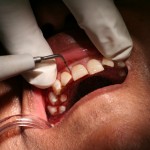
The destructive form of periodontal disease, periodontitis, affects approximately 50% of adults and over 60% of over 65 year olds, with severe periodontitis affecting 10–15% of populations. It is biologically plausible that chronic inflammation from periodontal disease has an impact on diabetes control and a number of epidemiological studies have highlighted associations between the two diseases.
The aim of this review was to evaluate the effect of non-surgical periodontal treatment (NSPT) on glycemic control in patients affected by diabetes and periodontal diseases.
Searches were conducted in the Medline, Embase and the Cochrane Central Register of Controlled Trials databases. This was supplemented by handsearching of the Journal of Clinical Periodontology, Journal of Periodontology, Journal of Dental Research, Journal of Dentistry, Journal of Periodontal Research, International Journal of Periodontics and Restorative Dentistry, Periodontology 2000, Odontology, Clinical Oral Investigations, Annals of Periodontology, Journal of American Dental Association, British Dental Journal, Community Dentistry and Oral Epidemiology, Diabetes, Diabetes Care, Diabetes & Metabolic Syndrome, Diabetes & Metabolism and Annals of Internal Medicine. There were no language restrictions.
Randomised controlled trials (RCTs) on diabetic patients with periodontal disease that reported glycated hemoglobin (HbA1c) and/or fasting plasma glucose (FPG) modification after treatment with a minimum of 3 months follow up were included. Two reviewers assessed independently assessed study quality using Cochrane risk of bias approach. Meta-analysis was carried out to evaluate the effect of non-surgical periodontal treatment on HbA1c and FPG levels. The effect of the adjunctive use of antimicrobials was also assessed
- 15 studies were included. ( 5 were considered to be at low risk of bias and 3 at high risk of bias)
- For HbA1c
- At the 3–4 months follow up, the weighted mean difference was -0.38% (95% CI -0.23 to -0.53; P < 0.001) [ 7 studies contributing to meta-analysis] and
- at 6 months it was -0.31% (95% CI 0.11 to -0.74; P = 0.15), favoring the treatment groups [ 3 studies contributing to meta-analysis]
- Heterogeneity of the study outcomes was statistically significant for both comparisons.
- For FPG
- At the 3–4 months follow up, the weighted mean difference was -9.01 mg/dL (95% CI -2.24 to -15.78; P = 0.009) [5 studies contributing]
- At 6 months it was -13.62 mg/dL (95% CI 0.45 to -27.69; P = 0.06) [2 studies contributing]
- Heterogeneity not significant
- Two studies (60 participants)evaluated the effect of adjunctive antimicrobial devices on periodontal treatment with 3-4month follow up. ,a non-significant increase of HbA1c was observed 3 months after treatment, whereas FPG decreased by 0.27 mg/dL (95% CI 39.56 to -40.11; P = 0.99).
The authors concluded
Despite the limitations of the present study, it can be concluded that periodontal treatment might be effective in improving metabolic control in terms of reduction of HbA1c and FPG concentrations in patients with diabetes. However, the significance of this improvement is questionable and should be further investigated.
Comment
The Cochrane review by Simpson et al published in 2010 included 7 studies with 3 contributing to a meta-analysis. Two trials included in the Cochrane review have not been included in this review. However, only one of the outcomes assessed in this review, HbA1c was also assessed by Simpson et al. Six studies included in the new review have been published since the Cochrane review. The mean difference in HbA1c of -0.38% in this new review is similar to that found in the Simpson review of -0.40% (95% CI -0.78% to -0.01%) . However despite the inclusion of the additional studies in this review the clinical importance for diabetics is still unclear. Although the treatment of active periodontal disease in itself is beneficial to oral health and quality of life.
Links
Corbella S, Francetti L, Taschieri S, De Siena F, Fabbro MD. Effect of periodontal treatment on glycemic control of patients with diabetes: A systematic review and meta-analysis. J Diabetes Investig. 2013 Sep 13;4(5):502-9. doi: 10.1111/jdi.12088. Epub 2013 Apr 18. PubMed PMID: 24843701; PubMed Central PMCID: PMC4025114.
Simpson TC, Needleman I, Wild SH, Moles DR, Mills EJ. Treatment of periodontal disease for glycaemic control in people with diabetes. Cochrane Database of Systematic Reviews 2010, Issue 5. Art. No.: CD004714. DOI: 10.1002/14651858.CD004714.pub2.

[…] Dental Elf -26th Jun-2014 – Periodontal treatment may be effective in improving metabolic cont… […]